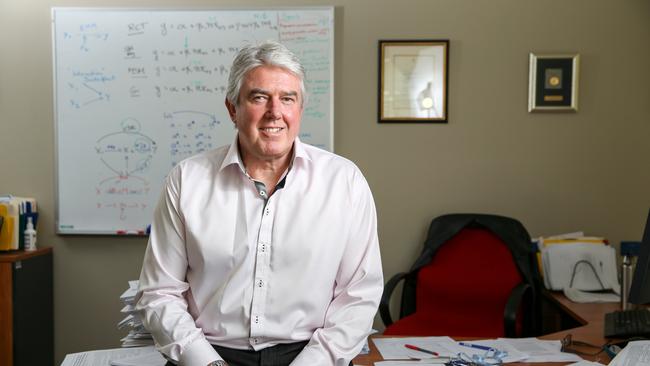University of Adelaide research finds life skills just as important as brains for students’ success
A QUEST to find ingredients required for students to do well at school and have successful careers, driven by University of Adelaide researchers, affirms there’s more to life than intelligence.
A QUEST to find ingredients required for students to do well at school and have successful careers, driven by University of Adelaide researchers, affirms there’s more to life than brains.
Attention, self-regulation and perseverance are among the important attributes listed in the first systematic review of existing knowledge published today in the journal Nature Human Behaviour.
Public health Professor John Lynch said the “massive review of the entire field” in collaboration with colleagues at the University of Bristol screened 9553 publications and analysed more than 550 from around the world.
“There's a stack of research on so-called non-cognitive skills, which is a clumsy name but it ranges from things like perseverance to attention,” the Professor said.
“There’s a lot of common sense behind this, but nobody had ever gone through the process of trying to review the entire body of literature, asking what do we know and what’s reliable in that?”

Unfortunately much of the research was unreliable, with just 222 better-quality studies, so it wasn’t possible to rank the different qualities and life skills against the chances of success.
While researchers seek “greater conceptual clarity on what the active ingredient is”, Prof Lynch says it’s clear that parents, carers and teachers can help children develop these life skills.
“Everybody knows about the ‘terrible twos’ and that is partly kids learning to regulate their behaviours,” he said.
“That's exactly the skills we're talking about … So for those kids that fall behind in regulating their behaviours, is there anything special we can do to help those kids develop? That's what this is about.”
It’s also possible to learn about managing behaviour and better ways to respond to life’s challenges, presenting a “really important opportunity” for researchers and educators to look into.
Lead author Associate Professor Lisa Smithers said early intervention was likely to have better results.
“Many interventions that target non-cognitive skills development have been conducted in school settings and involve teachers and parents but most of this work has been done in other countries,” she said.
“We didn’t find any interventions in Australian schools that were formally tested and published in peer-reviewed literature.”
The research received funding from the Australian National Health and Medical Research Council, and the UK Economic and Social Research Council.
A QUICK GUIDE TO “NON-COGNITIVE SKILLS”:
ATTENTION: A state of awareness in which the senses are focused selectively on aspects of the environment and the central nervous system is in a state of readiness to respond to stimuli.
COGNITIVE FLEXIBILITY: This refers to a capacity for objective appraisal of and appropriate, flexible action. It involves adaptability, objectivity and fair-mindedness.
CONSCIENTIOUSNESS: The tendency to be organised, responsible and hardworking, construed as a dimension of individual differences in the Big Five and Five-Factor Personality models.
DELAY OF GRATIFICATION: The ability to forgo immediate reward for the sake of greater, future reward based on the original definitions by Mischel.
EFFORTFUL CONTROL: Includes the abilities to voluntarily manage attention (attentional regulation) and inhibit (inhibitory control) or activate (activational control) behaviour as needed to adapt, especially when the child does not particularly want to do so.
EMOTIONAL REACTIVITY: The extent to which an individual experiences emotions (1) in response to a wide array of stimuli (emotion sensitivity), (2) strongly or intensely (emotion intensity) and (3) for a prolonged period of time before returning to a baseline level of arousal (emotion persistence).
EMOTIONAL REGULATION: The ability of an individual to modulate an emotion or set of emotions. Techniques of conscious emotional regulation can include learning to construe situations differently to manage them better and recognising how different behaviours can be used in the service of a given emotional state.
EXECUTIVE FUNCTION: Higher-level cognitive processes that organise and order behaviour, such as judgment, abstraction and concept formation, logic and reasoning, problem solving, planning and sequencing of actions.
IMPULSIVITY: Behaviour characterised by little or no forethought, reflection or consideration of the consequences.
INHIBITORY CONTROL: The ability to suppress a prepotent response, interrupt an ongoing response and resist distraction from external stimuli.
PERSISTENCE: The quality or state of maintaining a course of action or keeping at a task and finishing it despite the obstacles (such as opposition or discouragement) or the effort involved.
SELF-CONTROL: The ability to be in command of one’s behaviour (overt, covert, emotional or physical) and to restrain or inhibit one’s impulses.
SELF-REGULATION: The control of one’s own behaviour through the use of self-monitoring (keeping a record of behaviour), self-evaluation (assessing the information obtained during self-monitoring) and self-reinforcement (rewarding oneself for appropriate behaviour or for attaining a goal).
TEMPERAMENT: The basic foundation of personality, usually assumed to be biologically determined and present early in life, including characteristics such as energy level, emotional responsiveness, demeanour, mood, response tempo and willingness to explore.
WORKING MEMORY: A multi-compartment model of short-term memory that has a phonological (or articulatory) loop to retain verbal information, a visuospatial scratchpad to retain visual information and a central executive to deploy attention between them.
SOURCE: A systematic review and meta-analysis of effects of early life non-cognitive skills on academic, psychosocial, cognitive and health outcomes, in Nature Human Behaviour.



